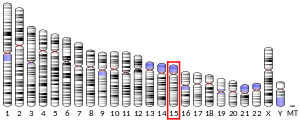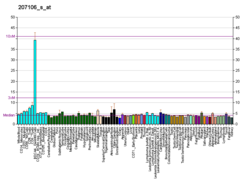Leukocyte receptor tyrosine kinase
Appearance
Leukocyte receptor tyrosine kinase is an enzyme that in humans is encoded by the LTK gene.[5][6]
Function
The protein encoded by this gene is a member of the ALK/LTK receptor family of receptor tyrosine kinases (RTKs) whose ligand is unknown.[7] Closely related to the insulin receptor family of RTKs. Tyrosine-specific phosphorylation of proteins is a key to the control of diverse pathways leading to cell growth and differentiation. Two alternatively spliced transcript variants encoding different isoforms have been described for this gene.[6]
Interactions
LTK has been shown to interact with IRS-1, Shc, and PIK3R1.[8][9]
References
- ^ a b c GRCh38: Ensembl release 89: ENSG00000062524 – Ensembl, May 2017
- ^ a b c GRCm38: Ensembl release 89: ENSMUSG00000027297 – Ensembl, May 2017
- ^ "Human PubMed Reference:". National Center for Biotechnology Information, U.S. National Library of Medicine.
- ^ "Mouse PubMed Reference:". National Center for Biotechnology Information, U.S. National Library of Medicine.
- ^ Maru Y, Hirai H, Takaku F (May 1990). "Human ltk: gene structure and preferential expression in human leukemic cells". Oncogene Res. 5 (3): 199–204. PMID 2320375.
- ^ a b "Entrez Gene: LTK leukocyte tyrosine kinase".
- ^ Lopes SS, Yang X, Müller J, Carney TJ, McAdow AR, Rauch GJ, Jacoby AS, Hurst LD, Delfino-Machín M, Haffter P, Geisler R, Johnson SL, Ward A, Kelsh RN (2008). "Leukocyte tyrosine kinase functions in pigment cell development". PLOS Genet. 4 (3): e1000026. doi:10.1371/journal.pgen.1000026. PMC 2265441. PMID 18369445.
{{cite journal}}: CS1 maint: unflagged free DOI (link) - ^ Kozutsumi H, Toyoshima H, Hagiwara K, Yazaki Y, Hirai H (October 1994). "Human ltk receptor tyrosine kinase binds to PLC-gamma 1, PI3-K, GAP and Raf-1 in vivo". Oncogene. 9 (10): 2991–8. PMID 8084603.
- ^ Ueno H, Honda H, Nakamoto T, Yamagata T, Sasaki K, Miyagawa K, Mitani K, Yazaki Y, Hirai H (June 1997). "The phosphatidylinositol 3' kinase pathway is required for the survival signal of leukocyte tyrosine kinase". Oncogene. 14 (25): 3067–72. doi:10.1038/sj.onc.1201153. PMID 9223670.
Further reading
- Krolewski JJ, Dalla-Favera R (1991). "The ltk gene encodes a novel receptor-type protein tyrosine kinase". EMBO J. 10 (10): 2911–9. doi:10.1002/j.1460-2075.1991.tb07841.x. PMC 453005. PMID 1655406.
- Krolewski JJ, Lee R, Eddy R, Shows TB, Dalla-Favera R (1990). "Identification and chromosomal mapping of new human tyrosine kinase genes". Oncogene. 5 (3): 277–82. PMID 2156206.
- Ben-Neriah Y, Bauskin AR (1988). "Leukocytes express a novel gene encoding a putative transmembrane protein-kinase devoid of an extracellular domain". Nature. 333 (6174): 672–6. Bibcode:1988Natur.333..672B. doi:10.1038/333672a0. PMID 2836739. S2CID 4262549.
- Toyoshima H, Kozutsumi H, Maru Y, Hagiwara K, Furuya A, Mioh H, Hanai N, Takaku F, Yazaki Y, Hirai H (1993). "Differently spliced cDNAs of human leukocyte tyrosine kinase receptor tyrosine kinase predict receptor proteins with and without a tyrosine kinase domain and a soluble receptor protein". Proc. Natl. Acad. Sci. U.S.A. 90 (12): 5404–8. Bibcode:1993PNAS...90.5404T. doi:10.1073/pnas.90.12.5404. PMC 46728. PMID 7685902.
- Richard I, Broux O, Chiannilkulchai N, Fougerousse F, Allamand V, Bourg N, Brenguier L, Devaud C, Pasturaud P, Roudaut C (1995). "Regional localization of human chromosome 15 loci". Genomics. 23 (3): 619–27. doi:10.1006/geno.1994.1550. PMID 7851890.
- Kozutsumi H, Toyoshima H, Hagiwara K, Yazaki Y, Hirai H (1994). "Human ltk receptor tyrosine kinase binds to PLC-gamma 1, PI3-K, GAP and Raf-1 in vivo". Oncogene. 9 (10): 2991–8. PMID 8084603.
- Kozutsumi H, Toyoshima H, Hagiwara K, Furuya A, Mioh H, Hanai N, Yazaki Y, Hirai H (1993). "Identification of the human ltk gene product in placenta and hematopoietic cell lines". Biochem. Biophys. Res. Commun. 190 (2): 674–9. doi:10.1006/bbrc.1993.1101. PMID 8427607.
- Ueno H, Sasaki K, Kozutsumi H, Miyagawa K, Mitani K, Yazaki Y, Hirai H (1996). "Growth and survival signals transmitted via two distinct NPXY motifs within leukocyte tyrosine kinase, an insulin receptor-related tyrosine kinase". J. Biol. Chem. 271 (44): 27707–14. doi:10.1074/jbc.271.44.27707. PMID 8910363.
- Snijders AJ, Ho SC, Haase VH, Pillai S, Bernards A (1997). "A lymphocyte-specific Ltk tyrosine kinase isoform is retained in the endoplasmic reticulum in association with calnexin". J. Biol. Chem. 272 (2): 1297–301. doi:10.1074/jbc.272.2.1297. PMID 8995435.
- Ueno H, Honda H, Nakamoto T, Yamagata T, Sasaki K, Miyagawa K, Mitani K, Yazaki Y, Hirai H (1997). "The phosphatidylinositol 3' kinase pathway is required for the survival signal of leukocyte tyrosine kinase". Oncogene. 14 (25): 3067–72. doi:10.1038/sj.onc.1201153. PMID 9223670.
- Espanel X, Huguenin-Reggiani M, Hooft van Huijsduijnen R (2003). "The SPOT technique as a tool for studying protein tyrosine phosphatase substrate specificities". Protein Sci. 11 (10): 2326–34. doi:10.1110/ps.0213402. PMC 2373693. PMID 12237455.
- Li N, Nakamura K, Jiang Y, Tsurui H, Matsuoka S, Abe M, Ohtsuji M, Nishimura H, Kato K, Kawai T, Atsumi T, Koike T, Shirai T, Ueno H, Hirose S (2004). "Gain-of-function polymorphism in mouse and human Ltk: implications for the pathogenesis of systemic lupus erythematosus". Hum. Mol. Genet. 13 (2): 171–9. doi:10.1093/hmg/ddh020. PMID 14695357.






